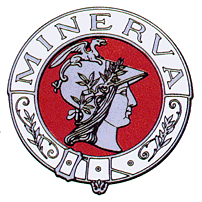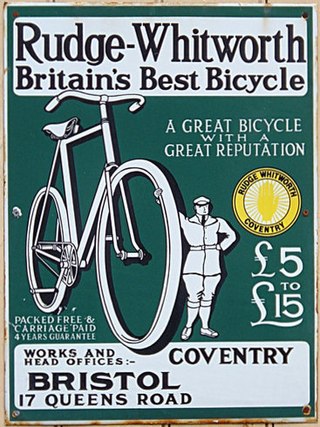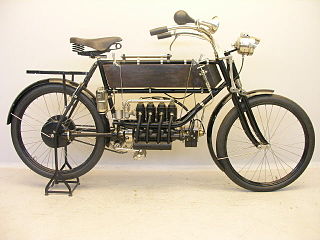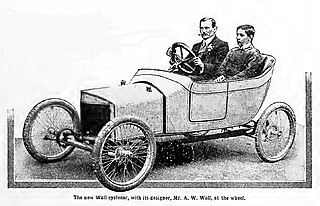
The Alcyon was a French bicycle, automobile and motorcycle manufacturer between 1903 and 1954.

The Alcyon was a French bicycle, automobile and motorcycle manufacturer between 1903 and 1954.
Alcyon originated from about 1890 when Edmond Gentil started the manufacture of bicycles in Neuilly, Seine. In 1902, this was complemented by motorcycle production and in 1906, the first cars were shown at the "Salon de l'Automobile" in Paris, France. Also in 1906 it founded the professional Alcyon cycling team which was active until 1955, including winning the Tour de France 6 times.
In 1912 Alcyon competed at the Isle of Man TT races with a 348cc single-cylinder engine featuring two inlet valves and two exhaust valves. [1] Both bikes failed to finish the Junior TT race. [2]
Alcyon had local success in France during the 1920s, with riders such as Marc Jolly, Marcel Mourrier, Jean Durand and Lucien Lemasson winning races. [3] During this time too, this bicycle brand got its nickname "l'intrépide Alcyon".
Two models were shown in 1906, one a two-seat light car with single-cylinder 950 cc engine and a larger four seat model with 1.4-litre four-cylinder engine. Both engines were bought in from Gentil. The cars were advanced models with 3-speed gearboxes and shaft drive. However, the single-cylinder models were dropped in 1912 and larger models of up to 2120 cc were added to the range. By then, most of the engines were obtained from Zurcher.
The company moved to Courbevoie, Seine in 1912.
In 1954 Peugeot absorbed Alcyon.




In 1914, the company's name was changed to Automobiles Alcyon. After the war, the first model was a 1914 cc four-cylinder model, some examples of which were tuned and sold by the Lyons agent as Alycon-GLs and performed quite well in competition. However, the car was not a success and did not sell well, so in 1923, Alcyon moved into the production of cyclecars, using 500 cc two-stroke flat-twin engines in a design bought from SIMA-Violet. Later the company manufactured another cyclecar of similar design, thought this one featured a single-cylinder engine. This proved a complete flop, and the company failed in 1928. Alcyon never sold cars again.
In 1946, the "Gentil Trophy" was created in memory of the founder of Cycles Alcyon, who died that year. It was awarded for the "achievement of the year", and took the form of a work of art created by Carlo Sarrabezolles. Each National Federation expressed its choice and the winner had to obtain 70% of the votes to obtain this honorary title. [4]
The company also gave its name to a race, the Grand critérium Alcyon, open to independent and aspiring riders under U.V.F. regulations.

Velocette is a range of motorcycles made by Veloce Ltd, in Hall Green, Birmingham, England. One of several motorcycle manufacturers in Birmingham, Velocette was a small, family-owned firm, selling almost as many hand-built motorcycles during its lifetime as the mass-produced machines of the giant BSA and Norton concerns. Renowned for the quality of its products, the company was "always in the picture" in international motorcycle racing from the mid-1920s until the 1950s, culminating in two World Championship titles and its legendary and still-unbeaten 24 hours at over 100 mph (161 km/h) record. Veloce, while small, was a great technical innovator and many of its patented designs are commonplace on motorcycles today, including the positive-stop foot shift and swinging arm rear suspension with hydraulic dampers. The business suffered a gradual commercial decline during the late 1960s, eventually closing in February 1971.

Minerva was a Belgian firm active from 1902 to 1938 and a manufacturer of luxury automobiles. The company became defunct in 1956.

NSU Motorenwerke AG, or NSU, was a German manufacturer of automobiles, motorcycles and pedal cycles, founded in 1873. Acquired by Volkswagen Group in 1969, VW merged NSU with Auto Union, creating Audi NSU Auto Union AG, ultimately Audi. The NSU name is an abbreviation of "Neckarsulm Strickmaschinen Union".

A. J. Stevens & Co. Ltd was a British automobile and motorcycle manufacturer in operation from 1909 to 1931. The company was founded by Joe Stevens in Wolverhampton, England. After the firm was sold, the name continued to be used by Matchless, Associated Motorcycles and Norton-Villiers on four-stroke motorcycles until 1969, and since the name's resale in 1974, on lightweight, two-stroke scramblers and today on small-capacity roadsters and cruisers. The company held 117 motorcycle world records.

Singer Motors Limited was a British motor vehicle manufacturing business, originally a bicycle manufacturer founded as Singer & Co by George Singer, in 1874 in Coventry, England. Singer & Co's bicycle manufacture continued. From 1901 George Singer's Singer Motor Co made cars and commercial vehicles.
The Scott Motorcycle Company was owned by Scott Motors (Saltaire) Limited, Saltaire, West Yorkshire, England and was a well-known producer of motorcycles and light engines for industry. Founded by Alfred Angas Scott in 1908 as the Scott Engineering Company in Bradford, Yorkshire, Scott motorcycles were produced until 1978.
Initially started in a rented workshop, Alfred moved the business to Hirstwood Works, Hirstwood Road, Saltaire. This building is still standing and has industrial use.

Sunbeam Cycles made by John Marston Limited of Wolverhampton was a British brand of bicycles and, from 1912 to 1956 motorcycles.

Matchless is one of the oldest marques of British motorcycles, manufactured in Plumstead, London, between 1899 and 1966. A wide range of models were produced under the Matchless name, ranging from small two-strokes to 750 cc four-stroke twins. Matchless had a long history of racing success; a Matchless ridden by Charlie Collier won the first single-cylinder race in the first Isle of Man TT in 1907.
Wooler was a British manufacturer of motorcycles and automobiles, founded by engineer John Wooler in 1911 based in Alperton, Middlesex. The company became known for its unconventional designs which included several fore-and-aft twins, a vertical camshaft single cylinder machine, a transverse-four beam engine, and a transverse flat four. Most machines possessed Wooler's enduring design features of a petrol tank which extended past the steering head.

The New Hudson Cycle Co. was originally started in 1890 by George Patterson, and manufactured 'safety' bicycles in Birmingham. In 1903 they produced their first motorcycle, but times became tough for Patterson after one of his sons died in WW1 and the other lost a leg. The family sold the factory to HJ Bructon after WW1, and in 1920 the company was reformed as New Hudson Ltd.

Rudge Whitworth Cycles was a British bicycle, bicycle saddle, motorcycle and sports car wheel manufacturer that resulted from the merger of two bicycle manufacturers in 1894, Whitworth Cycle Co. of Birmingham, founded by Charles Henry Pugh and his two sons Charles Vernon and John, and Rudge Cycle Co. of Coventry.

Douglas was a British motorcycle manufacturer from 1907 to 1957 based in Kingswood, Bristol, owned by the Douglas family, and especially known for its horizontally opposed twin cylinder engined bikes and as manufacturers of speedway machines. The company also built a range of cars between 1913 and 1922.
Rex, Rex Motorcycles, Rex-Acme, was a car and motorcycle company which began in Birmingham, England in 1900. Rex soon merged with a Coventry maker of bicycles and cars named Allard and then later in 1922 the company merged with Coventry's 'Acme' motorcycle company forming 'Rex Acme'. The company existed until 1933, and, in its heyday, was considered one of the greatest names in the British motorcycle industry.

The Gladiator Cycle Company, Clément-Gladiator, was a French manufacturer of bicycles, motorcycles and cars based in Le Pré-Saint-Gervais, Seine.

Premier Motorcycles were British motorcycles manufactured by a business founded as a bicycle manufacturer by W. H. Herbert and William Hillman in 1876. Their "Hillman and Herbert Cycle Company" was renamed "Premier Cycle Co." in 1891.

Quadrant was one of the earliest British motorcycle manufacturers, established in Birmingham in 1901. Famous for their big singles, Quadrant pioneered many innovations that proved important for motorcycle development but struggled after the First World War and the company was wound up in 1928.

The FN Four was the world's first production inline-4 motorcycle, manufactured in Liége by Fabrique Nationale from 1905 until 1923. It was also, at 40 miles per hour (64 km/h), the world's fastest production motorcycle from 1911 until 1912.

BSA motorcycles were made by the Birmingham Small Arms Company Limited (BSA), which was a major British industrial combine, a group of businesses manufacturing military and sporting firearms; bicycles; motorcycles; cars; buses and bodies; steel; iron castings; hand, power, and machine tools; coal cleaning and handling plants; sintered metals; and hard chrome process.
F. E. Baker Ltd was a British motorcycle engine and cyclecar engine manufacturer based in the Precision Works, Moorsom Street, Birmingham, England. Founded in 1906 by Frank Edward Baker, the company produced motorcycle engines under the Precision trademark until 1919. Precision engines were used by a wide range of motorcycle manufacturers in the United Kingdom and in other parts of the Commonwealth and were also used in cyclecars. Many manufacturers used the 'Precision' trademark as part of their model names, and in 1912 there was a 'Precision' motorcycle sold in Australia, but it is unclear if this was manufactured by F. E. Baker or just permitted use of the trademark by a motorcycle manufacturer.

Arthur William Wall was an engineer in the field of motorised transport and inventor of the self-powered wheel in England in the early 20th century. He is best known for his creation of the self-powered wheel, the Wall Autowheel, which could be used to power a bicycle, but he was also the man behind Roc motorcycles and a tricar and four-wheel cyclecar. His main company was A. W. Wall Ltd, but he created several other companies to compartmentalise his different activities, such as the Roc Gear Co, who supplied epicyclic gears to a significant number of manufacturers before WW1.